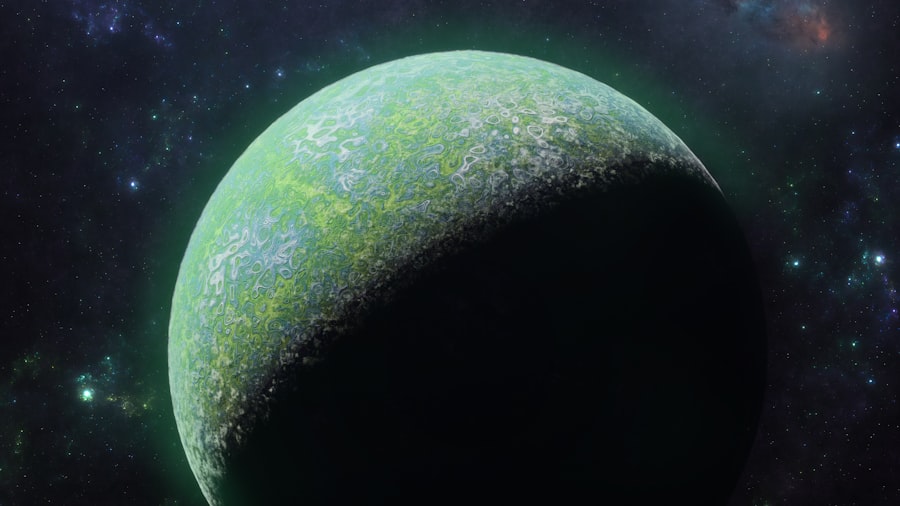Enceladus, one of Saturn’s most intriguing moons, has captured the attention of scientists and space enthusiasts alike. This icy celestial body, measuring about 500 kilometers in diameter, is renowned for its striking surface features and the plumes of water vapor that erupt from its south pole. These geysers, which were first discovered by the Cassini spacecraft, suggest the presence of a subsurface ocean beneath its icy crust.
The potential for life in such an environment has sparked considerable interest in Enceladus as a target for future exploration. As humanity looks toward the stars, the idea of utilizing Enceladus as a service module for various space missions has emerged as a fascinating concept. The notion of a service module typically refers to a spacecraft component that provides essential support functions, such as propulsion, power, and life support.
Enceladus, with its unique characteristics and resources, presents an opportunity to rethink how space missions could be conducted. By harnessing the moon’s natural resources and leveraging its geological features, space agencies could potentially create a sustainable platform for exploration beyond Earth. This article will delve into the potential benefits and challenges of using Enceladus as a service module, exploring its feasibility, environmental considerations, technical requirements, economic implications, and ethical concerns.
Key Takeaways
- Enceladus is a moon of Saturn with a subsurface ocean and potential for hosting life
- Using Enceladus as a service module could provide access to resources such as water and fuel
- Challenges of using Enceladus include the harsh environment and distance from Earth
- Current research includes the study of plumes and potential habitability of Enceladus
- Feasibility of utilizing Enceladus as a service module depends on technological advancements and cost-effectiveness
Potential benefits of using Enceladus as a service module
Utilizing Enceladus as a service module could offer numerous advantages for future space missions. One of the most significant benefits is the availability of water ice, which is abundant on the moon’s surface. Water is a critical resource for any long-term space mission, serving not only as a source of drinking water but also as a key component for producing oxygen and hydrogen through electrolysis.
This capability could enable astronauts to generate fuel for return journeys or further exploration, significantly reducing the need to transport these resources from Earth. Moreover, Enceladus’s subsurface ocean may harbor organic compounds and other materials that could be invaluable for scientific research and potential biotechnological applications. The moon’s geysers provide direct access to these materials without the need for extensive drilling or excavation.
By studying the ejected plumes, scientists could gain insights into the moon’s geological history and assess its potential for supporting life. This unique opportunity to explore an extraterrestrial ocean could lead to groundbreaking discoveries about the origins of life in the universe.
Challenges of using Enceladus as a service module

Despite its potential benefits, using Enceladus as a service module presents several challenges that must be addressed. One of the primary concerns is the harsh environmental conditions on the moon’s surface. Temperatures can plummet to around -200 degrees Celsius, creating significant obstacles for any equipment or human presence.
Developing technology that can withstand such extreme cold while remaining functional will be crucial for any mission involving Enceladus. Additionally, the logistics of transporting materials and personnel to and from Enceladus pose another significant challenge. The moon’s distance from Earth means that any mission would require advanced propulsion systems capable of making the journey efficiently.
Furthermore, establishing a sustainable presence on Enceladus would necessitate robust infrastructure capable of supporting life in an inhospitable environment. This includes habitats that can provide adequate protection from radiation and extreme temperatures while ensuring a reliable supply of energy and resources.
Current research and exploration of Enceladus
| Research Area | Findings |
|---|---|
| Geological Activity | Ongoing geysers and plumes of water vapor and ice particles |
| Subsurface Ocean | Evidence of a global ocean beneath the icy crust |
| Potential for Life | Detection of organic molecules and energy sources for microbial life |
| Future Missions | Proposed missions to further explore Enceladus and its potential habitability |
Current research on Enceladus has primarily been driven by data collected from NASA’s Cassini spacecraft, which orbited Saturn from 2004 to 2017. The mission provided invaluable insights into the moon’s surface composition, geological activity, and potential habitability. Cassini’s close flybys revealed the presence of organic molecules in the plumes, further fueling interest in the moon as a candidate for astrobiological studies.
In addition to Cassini’s findings, ongoing research efforts are focused on analyzing data from Earth-based telescopes and developing new missions aimed at further exploring Enceladus. Proposed missions include landers or orbiters designed to study the moon’s surface and subsurface ocean in greater detail.
Feasibility of utilizing Enceladus as a service module
The feasibility of utilizing Enceladus as a service module hinges on several factors, including technological advancements, mission planning, and international collaboration. As space agencies continue to develop more efficient propulsion systems and life support technologies, the prospect of reaching and operating on Enceladus becomes increasingly plausible. However, careful consideration must be given to mission design to ensure that objectives align with available resources and capabilities.
Moreover, international collaboration will play a crucial role in making such ambitious missions feasible. The complexities involved in exploring and utilizing Enceladus require shared expertise and resources among nations. Collaborative efforts could lead to innovative solutions for overcoming technical challenges while fostering a sense of global unity in the pursuit of knowledge about our solar system.
Environmental considerations for using Enceladus as a service module

When contemplating the use of Enceladus as a service module, environmental considerations must be at the forefront of mission planning. The potential impact on the moon’s delicate ecosystem is a significant concern, particularly given its status as one of the most promising locations for extraterrestrial life. Any human activity on or around Enceladus must prioritize minimizing contamination and preserving its natural state.
Additionally, understanding the moon’s geological processes is essential for ensuring that any operations do not inadvertently disrupt its environment. Researchers must carefully assess how resource extraction or habitat construction could affect local ecosystems and geological stability. Developing protocols for responsible exploration will be critical in maintaining the integrity of Enceladus while pursuing scientific knowledge.
Technical requirements for converting Enceladus into a service module
Transforming Enceladus into a functional service module will necessitate significant technical advancements across various domains. First and foremost, robust engineering solutions will be required to establish habitats capable of withstanding extreme temperatures and radiation levels. These habitats must provide life support systems that can recycle air and water while ensuring adequate protection from external hazards.
Furthermore, developing efficient energy generation systems will be crucial for sustaining operations on Enceladus. Solar power may be limited due to the moon’s distance from the Sun; therefore, alternative energy sources such as nuclear power or geothermal energy from its subsurface ocean may need to be explored. Additionally, advanced robotics will play a vital role in conducting maintenance tasks and resource extraction without risking human lives in such an inhospitable environment.
Potential economic implications of utilizing Enceladus as a service module
The economic implications of utilizing Enceladus as a service module are multifaceted and could have far-reaching consequences for space exploration and industry. Establishing a presence on this moon could open up new avenues for resource extraction, particularly in terms of water ice and potentially valuable minerals found beneath its surface. These resources could not only support future missions but also contribute to developing sustainable practices in space exploration.
Moreover, investing in technology and infrastructure for Enceladus could stimulate economic growth on Earth by creating jobs in engineering, research, and development sectors. As nations collaborate on missions to explore this moon, opportunities for public-private partnerships may arise, fostering innovation and driving advancements in space technology that could benefit various industries back home.
Comparison with other potential service module options
When considering Enceladus as a service module, it is essential to compare it with other potential options within our solar system. For instance, Mars has long been viewed as a prime candidate for human exploration due to its relatively accessible location and existing knowledge about its geology and atmosphere. However, Mars lacks the abundant water resources found on Enceladus, which could limit long-term sustainability for missions.
Similarly, other moons in our solar system—such as Europa or Ganymede—also present intriguing possibilities due to their subsurface oceans. However, each option comes with its own set of challenges related to distance, environmental conditions, and potential resource availability. Ultimately, while Enceladus may not be the only candidate for a service module, its unique characteristics make it a compelling choice worth exploring further.
Ethical considerations of using Enceladus as a service module
The ethical implications surrounding the use of Enceladus as a service module cannot be overlooked.
The prospect of contaminating an environment that may support extraterrestrial life raises profound ethical questions about our right to exploit these resources.
Furthermore, discussions surrounding planetary protection protocols must be prioritized to ensure that any activities conducted on Enceladus do not irreparably harm its ecosystem or compromise future scientific research opportunities. Engaging in open dialogue among scientists, ethicists, policymakers, and the public will be essential in navigating these complex issues while fostering responsible exploration practices.
Conclusion and future prospects for Enceladus as a service module
In conclusion, Enceladus presents an exciting opportunity for future space exploration as a potential service module. Its abundant water resources and intriguing geological features make it an attractive candidate for supporting long-term missions beyond Earth. However, significant challenges remain regarding environmental conditions, logistical considerations, technical requirements, and ethical implications.
As research continues to advance our understanding of this enigmatic moon, collaborative efforts among nations will be crucial in realizing its potential as a service module. By prioritizing responsible exploration practices and addressing ethical concerns head-on, humanity can pave the way for sustainable exploration that respects both our cosmic neighbors and our quest for knowledge about the universe we inhabit. The future prospects for utilizing Enceladus are bright; with continued innovation and cooperation, it may one day serve as a vital hub for humanity’s journey into the cosmos.
In exploring the intriguing question of whether Enceladus could serve as a viable service module for future space missions, it’s essential to consider the broader context of its unique features and potential. For a deeper understanding of the scientific findings related to Enceladus, you can refer to this insightful article on XFile Findings, which discusses the moon’s subsurface ocean and its implications for astrobiology and space exploration.
FAQs
What is Enceladus?
Enceladus is one of the moons of Saturn, and it is known for its icy surface and potential for hosting liquid water beneath its crust.
What is a service module?
A service module is a component of a spacecraft that provides support functions such as propulsion, power, and thermal control. It is often used to support the main spacecraft or payload.
Is Enceladus a service module?
No, Enceladus is not a service module. It is a natural satellite of Saturn and does not serve as a spacecraft component.
What is the significance of Enceladus in space exploration?
Enceladus is of interest to scientists and space exploration missions because of its potential for hosting liquid water beneath its icy surface. This makes it a potential candidate for hosting life beyond Earth.
How is Enceladus being studied by space agencies?
Space agencies such as NASA and the European Space Agency have conducted missions to study Enceladus, including flybys and the collection of data to better understand its composition and potential for hosting life.
